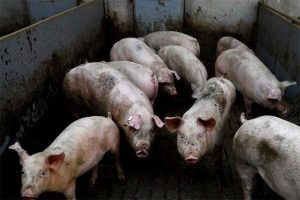By Adrian H. Halili, Reporter
HOG production is expected to expand next year with farmers attracted by strong market prices, as their risks are increasingly mitigated by the impending African Swine Fever (ASF) vaccine rollout, an industry group said.
“Next year, hog production will grow. Despite ASF outbreaks, farmers remain resilient and will repopulate because of continuous good liveweight prices,” Alfred Ng, vice-chairman of the National Federation of Hog Farmers, Inc., said via Viber.
During the third quarter, hog production declined 8% to 414,610 MT, according to the Philippine Statistics Authority.
Mr. Ng said that demand for pork will likely remain high as domestic supply continues to fall short.
He added that the INSPIRE (Integrated National Swine Production Initiatives for Recovery and Expansion) breeder program will “start bearing fruit next year.”
The ASF virus, which was first detected in the Philippines in 2019, has continued to affect the size of the hog herd, with infections triggering culls of animals in nearby farms.
The Philippines logged a resurgence of ASF cases in August, prompting the government to fast-track its limited vaccine rollout to commercial and small growers.
Recent outbreaks were blamed on the spread of contaminated water due to heavy rains and tropical cyclones during the second half.
“With more acceptance of the vaccine and with imminent announcement of vaccine success, we see (Food and Drug Administration) giving approval for commercial use and many farmers using vaccine secretly will now openly purchase vaccines to protect their herds,” he said.
The Department of Agriculture (DA) said approval for commercial use of the ASF vaccine could come by February or March.
Only the AVAC ASF Live vaccine from Vietnam has received approval for a limited government-controlled rollout. The Food and Drug Administration has issued a Certificate of Product Registration for AVAC, valid for two years and subject to annual review.
The DA has allocated P350 million to procure 600,000 doses for the hog farmers in the initial target areas.
“We hope that more vaccine will be trialed and approved so the vaccination costs come down,” he added.
“The pork price outlook will remain good for 2025. Farmers will be encouraged to repopulate and expand their businesses especially if a good commercial vaccine is available,” he said.
According to DA price monitors, as of Dec. 20, a kilogram of pork shoulder cost P300 to P380 per kilo in public markets, with pork belly fetching P340 to P420.
Mr. Ng said the pork trade in Cebu is expected to revive next year, adding to the supply of pork in the market.
“More important, breeder farms from Cebu and Bantayan Island can once again operate and help with the breeder supply on Luzon,” he added.
As of Dec. 6, 88 municipalities across 19 provinces had active ASF cases, according to the Bureau of Animal Industry.

